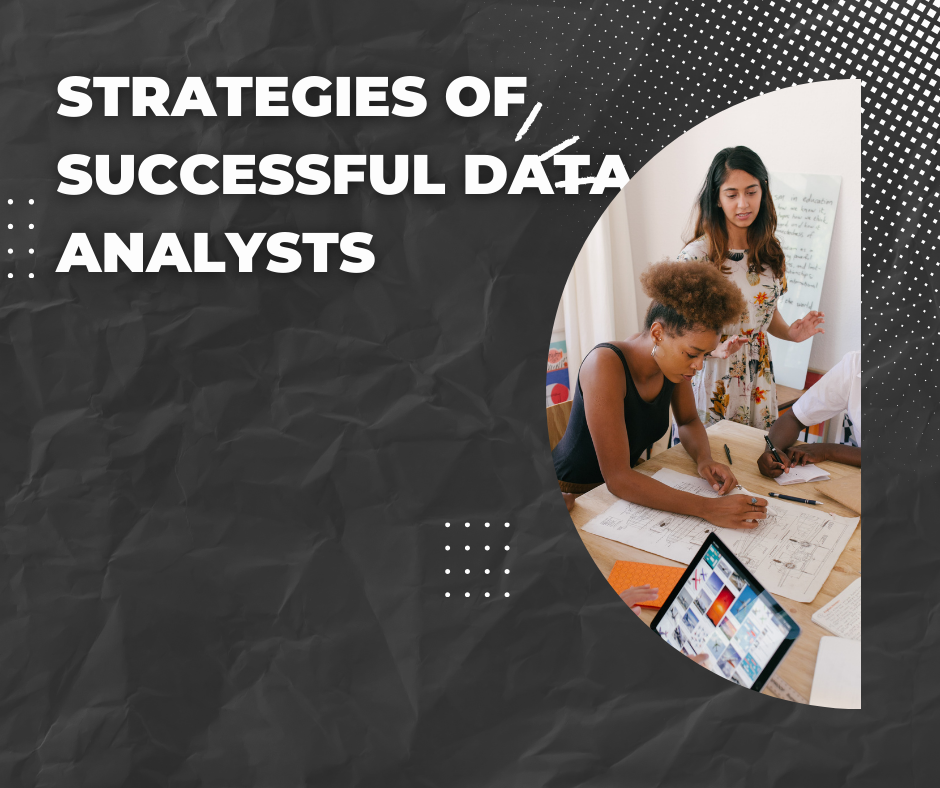Strategies of Successful Data Analysts
 Ruhi Parveen
Ruhi Parveen
Data analysis is a field that demands not only technical skills but also a strategic approach to problem-solving and decision-making. Successful data analysts blend their knowledge of data with effective strategies to derive insights that drive business decisions. Here, we explore the key strategies that set successful data analysts apart.
1. Understanding the Business Context
Know the Industry
Understanding the industry you're working in is crucial. Each industry has its own set of challenges, opportunities, and key performance indicators (KPIs). Whether it's finance, healthcare, marketing, or any other sector, knowing the specific dynamics and regulatory environment helps in providing relevant and actionable insights.
Align with Business Goals
Successful data analysts ensure that their work aligns with the business's overall goals. This involves collaborating with stakeholders to understand their objectives and translating these into data requirements. By focusing on what the business aims to achieve, analysts can prioritize their tasks and deliver insights that matter most.
2. Mastering Data Management
Data Collection
Collecting the right data is the first step. Successful data analysts use various methods to gather data, including surveys, web scraping, and utilizing existing databases. They ensure that the data collected is relevant, accurate, and comprehensive.
Data Cleaning
Data cleaning is a critical process that involves identifying and correcting errors in the data. This includes dealing with missing values, removing duplicates, and correcting inconsistencies. Clean data ensures that the analysis is reliable and the insights are trustworthy.
Data Integration
Often, data comes from multiple sources. Integrating these sources into a cohesive dataset is vital. Successful data analysts are skilled in merging different datasets and ensuring that they are consistent and usable for analysis.
3. Technical Proficiency
Proficiency in Tools
Data analysts need to be proficient in various tools and software.
Excel: For basic data manipulation and visualization.
SQL: For querying and managing databases.
Python/R: For advanced data analysis and statistical modeling.
Tableau/Power BI: For creating interactive and insightful data visualizations.
Statistical Knowledge
A solid understanding of statistics is fundamental. This includes knowledge of descriptive statistics, inferential statistics, probability distributions, hypothesis testing, and regression analysis. These statistical methods help in making sense of data and drawing valid conclusions.
4. Developing Analytical Thinking
Ask the Right Questions
Successful data analysts know how to ask the right questions. This involves critical thinking and curiosity. They delve deeper into the data to understand the underlying patterns and trends, rather than just scratching the surface.
Hypothesis Testing
Before diving into data analysis, formulating hypotheses can guide the process. Hypothesis testing helps in validating assumptions and ensuring that the analysis is focused and relevant.
5. Effective Communication
Data Storytelling
Data storytelling is about presenting data in a way that is engaging and easy to understand. Successful data analysts know how to craft a narrative around the data, highlighting key insights and making them relatable to the audience.
Visualization
Creating effective visualizations is an art. Using charts, graphs, and dashboards, data analysts can present complex data in a simplified manner. Good visualizations make it easier for stakeholders to grasp the insights and take action.
Reporting
Regular reporting is essential to keep stakeholders informed. Successful data analysts create comprehensive reports that are clear, concise, and tailored to the audience’s needs. They focus on actionable insights and recommendations, rather than just presenting data.
6. Continuous Learning and Adaptability
Stay Updated
The field of data analysis is constantly evolving with new tools, techniques, and best practices. Successful data analysts commit to continuous learning by taking courses, attending workshops, and reading relevant literature.
Adapt to Change
Adaptability is key in a rapidly changing environment. Whether it's a new tool, a shift in business strategy, or an unexpected challenge, successful data analysts are flexible and can adjust their approach as needed.
7. Building a Strong Network
Collaborate
Collaboration with other data professionals can lead to better outcomes. Successful data analysts often work in teams, sharing knowledge and insights. They also seek feedback and different perspectives to enhance their analysis.
Engage with the Community
Being part of the data analysis community helps in staying informed and inspired. Engaging in forums, attending conferences, and participating in online communities can provide valuable insights and opportunities for growth.
8. Ethical Considerations
Data Privacy
Respecting data privacy is paramount. Successful data analysts adhere to ethical standards and regulations regarding data privacy and security. They ensure that data is anonymized and protected from unauthorized access.
Transparency
Being transparent about the methods and limitations of the analysis builds trust. Successful data analysts clearly communicate how data was collected, processed, and analyzed, along with any assumptions or limitations.
9. Leveraging Automation and Advanced Techniques
Automation
Successful data analysts use scripts and tools to automate data cleaning, data processing, and report generation, allowing them to focus on more complex tasks.
Advanced Analytics
Techniques like machine learning, predictive analytics, and artificial intelligence can uncover deeper insights. Successful data analysts continuously explore and apply advanced analytical techniques to enhance their analysis.
10. Providing Actionable Insights
Focus on Actionability
Insights are only valuable if they can be acted upon. Successful data analysts ensure that their findings are practical and actionable. They provide clear recommendations and follow up to see how the insights are implemented.
Measure Impact
Tracking the impact of the insights provided is crucial. Successful data analysts measure how their recommendations affect business outcomes, using this feedback to refine their approach and demonstrate the value of their work.
Conclusion
Becoming a successful data analyst requires a combination of technical skills, strategic thinking, and effective communication. By understanding the business context, mastering data management, continuously learning, and focusing on actionable insights, data analysts can drive significant value for their organizations. Ethical considerations, collaboration, and leveraging advanced techniques further enhance their effectiveness. Adopting these strategies can set data analysts on a path to success, making them invaluable assets in the data-driven world. For those looking to enhance their skills, considering an Online Data Analytics Course in Delhi, Noida, Mumbai, Indore, and other parts of India can provide structured learning opportunities and practical experience in real-world scenarios.
Subscribe to my newsletter
Read articles from Ruhi Parveen directly inside your inbox. Subscribe to the newsletter, and don't miss out.
Written by

Ruhi Parveen
Ruhi Parveen
I am a Digital Marketer and Content Marketing Specialist, I enjoy technical and non-technical writing. I enjoy learning something new.